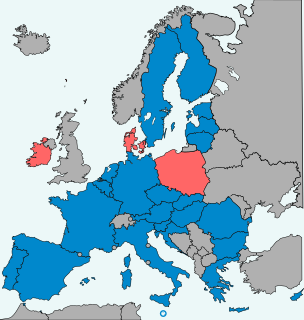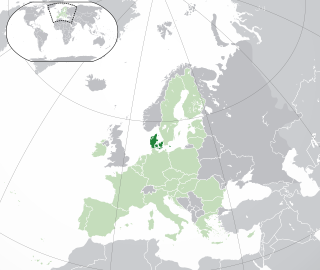
The European patent with unitary effect (EPUE), more commonly known as the unitary patent, is a new type of European patent in advanced stage of adoption which would be valid in participating member states of the European Union. Unitary effect can be registered for a European patent upon grant, replacing validation of the European patent in the individual countries concerned. The unitary effect means a single renewal fee, a single ownership, a single object of property, a single court and uniform protection—which means that revocation as well as infringement proceedings are to be decided for the unitary patent as a whole rather than for each country individually. Licensing is however to remain possible for part of the unitary territory.

The Treaty of Nice was signed by European leaders on 26 February 2001 and came into force on 1 February 2003.

Referendums in the United Kingdom are occasionally held at a national, regional or local level. National referendums can be permitted by an Act of Parliament and regulated through the Political Parties, Elections and Referendums Act 2000, but they are by tradition extremely rare due to the principle of parliamentary sovereignty meaning that they cannot be constitutionally binding on either the Government or Parliament, although they usually have a persuasive political effect.

The Single European Act (SEA) was the first major revision of the 1957 Treaty of Rome. The Act set the European Community an objective of establishing a single market by 31 December 1992, and codified European Political Cooperation, the forerunner of the European Union's Common Foreign and Security Policy. It was signed at Luxembourg on 17 February 1986, and at The Hague on 28 February 1986. It came into effect on 1 July 1987, under the Delors Commission.
There are three types of elections in Denmark: elections to the national parliament, local elections and elections to the European Parliament. Referendums may also be called to consult the Danish citizenry directly on an issue of national concern.

This is a list of referendums related to the European Union, or referendums related to the European Communities, which were predecessors of the European Union. Since 1972, a total of 48 referendums have been held by EU member states, candidate states, and their territories, with several additional referendums held in countries outside of the EU. The referendums have been held most commonly on the subject of whether to become a member of European Union as part of the accession process, although the EU does not require any candidate country to hold a referendum to approve membership or as part of treaty ratification. Other EU-related referendums have been held on the adoption of the euro and on participation in other EU-related policies.
A referendum on the sale of the Danish West Indian Islands to the United States of America was held in Denmark on 14 December 1916. The non-binding referendum saw 283,670 vote in favor of the sale of the Danish West Indian Islands and 158,157 against. The residents of the islands were not allowed to vote on the matter, but in an unofficial vote on St. Croix arranged by David Hamilton Jackson, 4,027 voted in favor of the sale and only seven voted against. As a result of the referendum the islands were formally relinquished to the United States by the Treaty of the Danish West Indies on 31 March 1917 as the United States Virgin Islands for a sum of US$25,000,000 in gold.
A constitutional and electoral age referendum was held in Denmark on 28 May 1953. Both proposals were approved by voters, leading to both a new constitution taking effect on 5 June, and the electoral age being lowered from 25 to 23 years, also starting on 5 June. Voter turnout was 59.1% for the constitution question and 57.1% for the voting age question.

In general, the law of the European Union is valid in all of the twenty-eight European Union member states. However, occasionally member states negotiate certain opt-outs from legislation or treaties of the European Union, meaning they do not have to participate in certain policy areas. Currently, four states have such opt-outs: United Kingdom, Denmark, Republic of Ireland and Poland.
Denmark holds opt-outs from European Union policies in relation to security and defence, citizenship, police and justice, and the adoption of the euro. They were secured under the Edinburgh Agreement in 1992 after a referendum for the ratification of the Maastricht Treaty was rejected by Danish voters, as a package of measure to assuage concerns raised during that referendum.

In the European Union (EU), enhanced cooperation is a procedure where a minimum of nine EU member states are allowed to establish advanced integration or cooperation in an area within EU structures but without the other members being involved. As of October 2017 this procedure is being used in the fields of divorce law, patents, property regimes of international couples, and European Public Prosecutor and is approved for the field of a financial transaction tax.

The Treaty of Lisbon is an international agreement that amends the two treaties which form the constitutional basis of the European Union (EU). The Treaty of Lisbon was signed by the EU member states on 13 December 2007, and entered into force on 1 December 2009. It amends the Maastricht Treaty (1993), known in updated form as the Treaty on European Union (2007) or TEU, and the Treaty of Rome (1957), known in updated form as the Treaty on the Functioning of the European Union (2007) or TFEU. It also amends the attached treaty protocols as well as the Treaty establishing the European Atomic Energy Community (EURATOM).

The politics of Denmark take place within the framework of a parliamentary representative democracy, a constitutional monarchy and a decentralised unitary state in which the monarch of Denmark, Queen Margrethe II, is head of state. Denmark is described as a nation state. Danish politics and governance are characterized by a common striving for broad consensus on important issues, within both the political community and society as a whole.

Denmark in the European Union refers to the historical and current issues of Denmark's membership in the European Union. Denmark has a permanent representation to the European Union led by ambassador Jeppe Tranholm-Mikkelsen, in Brussels. The current Foreign Minister and Minister for European Affairs is Anders Samuelsen.

The European Parliament election of 2014 in Denmark was an election held in Denmark on 25 May 2014 to decide who would represent Denmark in the European Parliament (EP) from 2014 to 2019. The Danish People's Party with 26.6% of the votes became the largest party for the first time in a nationwide Danish election.
A referendum is a direct vote in which an entire electorate is asked to either accept or reject a particular proposal. This article summarises referendum laws and practice in various countries.

The Treaties of the European Union are a set of international treaties between the European Union (EU) member states which sets out the EU's constitutional basis. They establish the various EU institutions together with their remit, procedures and objectives. The EU can only act within the competences granted to it through these treaties and amendment to the treaties requires the agreement and ratification of every single signatory.

The European Union Referendum Act 2015(c. 36) is an Act of the Parliament of the United Kingdom that made legal provision for a pre-legislative advisory referendum to be held in the United Kingdom of Great Britain and Northern Ireland and Gibraltar, on whether it should remain a member state of the European Union or leave it. The bill was introduced to the House of Commons by Philip Hammond, Foreign Secretary on 28 May 2015. The Act was subsequently passed by 316-53 votes on its third reading in the Commons on 7 September 2015 and was approved by the House of Lords on 14 December 2015, and given Royal Assent on 17 December 2015 and came partly into force on the same day and came into full legal force on 1 February 2016.














